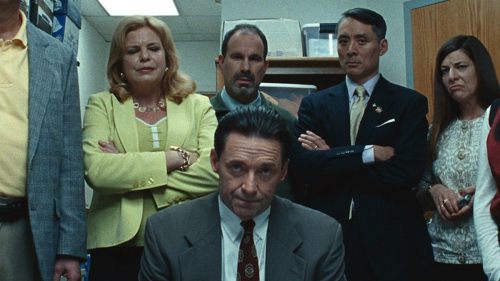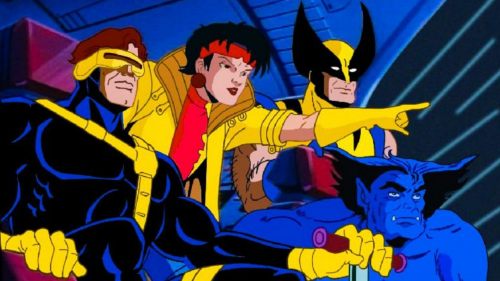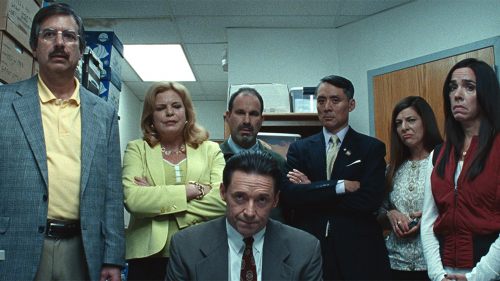LOGAN: The Things We Leave Behind
Spoilers to follow.
Twelve years from where we stand, mutants are no longer born and America is a scorching hellscape for the few that remain. The only sensible recourse, as the Gods of irony would have it, is to escape back to Canada where it all began. But Logan wants no part of a new community. He moonlights as a limo driver to save up enough money to live out at sea, where neither he nor his ailing mentor can cause people harm, away from the world the X-Men failed to preserve. He may have Caliban and Xavier in tow, invalids whose powers involve tracking down any mutants the world has left – a last-ditch effort at community – but to him their function is merely to help each other live out their final days.
Logan is truly alone.
Maybe he prefers it that way. In all the years we’ve seen him and in every changing timeline, death followed in his footsteps. His father, when he was a child in X-Men Origins. Scott Summers. Jean Grey. Soon enough, everyone else. He’s seen every war recognizable to the Western world, and was even at the epicenter of its atomic cruelty. Now death is inescapable. Even his rideshare job has him working at funerals when he isn’t slashing up violent carjackers. Most of all, he’s tired, and the adamantium bullet he carries is both a reminder of his past and the point beyond which he can’t see a future. It’s what took his original memories from him. It may as well take these new ones, the weight of two divergent stories that only he and Charles remember. They've seen it all, they've done it all, and it's still led them to misery. A bullet doesn't sound so bad.
Violence is the fabric of America in 2029. Logan’s white passengers party in apathy, some even chanting “U! S! A!” as they cross borders freely, while all the other characters he comes into contact with experience some form of despair. A black family on a farm fends off the encroaching heartlessness of corporate-hired goons trying to push them out by cutting off their water. A Mexican nurse begs for Logan’s help to escape the authorities, hoping to flee to Canada with her daughter. Logan was written before Flint came to light, before the Dakota Pipeline protests, before the refugee crisis hit its zenith, and before the threatening promises of this new administration, but it isn’t some magical prophecy. It’s a marker of where we’ve always been headed, our sins and our hatred never confronted; merely swept under the rug.
The X-Men movies always dabbled in the language and aesthetics of homophobia and racism, but rarely did they confront the roots of prejudice. The mutants died out because of the people who hated them, and now these same people – after poisoning their water, their drinks, the very food they consume – contort and twist the last of mutant blood to re-create them as they see fit: Passive. Controllable. A model minority.
One such experiment robbed of her childhood is X-23/Laura, made from the blood of Logan himself. The quiet type unlike her mouthy father, who drops F-bombs galore like his aged professor. This world is no longer sanitized, and for the likes of Laura, it’s been traumatic and abusive for as long as she’s been alive. She’s Logan, but denied the element of choice. Forced to kill to survive, and without the guidance of a figure like Charles Xavier, who’s spent the last seventeen years up on our screens, telling kids on the peripheries they’ll be okay. That they can be more. That they’re worthy of love and family. But now even Charles can’t fulfill his promise, residing in a drum that functions as an anti-Cerebro, suppressing the powers that once helped him heal through understanding. Now his powers only bring pain.
But Logan is not the dour film this setup would indicate. It is undoubtedly a film about lonely and morose people, and a violent one to boot, but it’s about the good these people do in their final days. More importantly, it’s about how they’re pushed to do it. How they find the things and people that make life worth living again, no matter how briefly, and it’s about reaching into the darkness of their pasts and finding a light worth sharing. It’s about the things that birthed us and made us who we are – the pain, the trauma, the unforgiving ugliness that we inflict on each other and on ourselves – but it’s also about where we go from there.
It’s about not becoming what they made you.
Logan was once kind of a hero. Once kind of a good guy, who went on adventures. Once kind of a father, who helped Rogue find safety, and guided her towards finding herself. Now he’s a myth. A shell of himself. A drifter without a purpose. The Wolverine exists in the pages of comics, but Logan struggles to retain that heroism. The world has given up on all those like him. He’s giving up on it in return. As Priscilla articulates, this dysfunctional family is all he has left. Even his good deeds result in the death of a family far more idyllic than his. While taking his final breath, a decent man holds Logan accountable.
On the other side of this equation is a family without love or empathy: Donald Pierce, Zander Rice, and their abominable creation. Rice and his Reavers hope to return Laura and her misfit friends to a status quo of imprisonment, finally deploying the latest “intellectual property” in their inhumane arsenal. X-24 is a perfect clone of The Wolverine, and a dark mirror for a wandering Logan. He is what Logan will become once he sheds his humanity; a rage-filled killer with allegiance to no one. He is the alternative to caring about the world once more. The promise of becoming what he was created for.
Pierce, Rice and X-24 chase Logan for the entire runtime; the possibility of an uncaring, unfeeling existence catching up to him like a phantom. A state of being he must outrun. The impulse for each step towards North Dakota is learning to care more about Laura, even if it's to help her reach a sanctuary he knows he will not find. The presence of X-Men comics in the film is more than just a wink to the audience. It not only creates a rift between Wolverine, the myth, and Logan, the flesh & blood, but it provides these dehumanized youths with a means of escape, both literal and metaphorical, like a portal to the innocence they were denied.
The “Eden” in this world’s X-Men comics no longer exists. It may never have existed, and yet its fictional locale becomes the meeting point for these kids before their escape. To them, it's real. It always was, and it represents hope – the kind Logan needs desperately to recognize. It’s perhaps the only hope that Laura has, and the only one she will ever have so long as Logan turns his back on the world. And like a self-fulfilling prophecy, these beautiful, gifted children of all sorts of ethnicities make real a storybook safehaven, building a microcosm of a better, kinder, more inclusive world through the lessons they learn from fiction.
When these kids lived with boots at their necks, they turned to X-Men stories and to the myth of The Wolverine. But it wasn’t The Wolverine that saved them. He did eventually, towards the end of the film, but it was the promise on the page that helped them find the strength to embark on their journey. Stories were their saviour because they helped them save themselves.
The stories left behind by others help Laura locate her father, but they also help her understand him. Raised in isolation and with no way to relate to the people around her, it’s a glimpse of a Western (Shane, perhaps the first movie she's seen, and one that left a mark on Charles as a child) that helps her comprehend Logan’s struggle while helping her put words to her own.
“There’s no living with a killing. There’s no going back. Right or wrong, it’s a brand. A brand that sticks.”
How do you live with your past? How do you live with the things you’ve done, and the things that were done to you? Where do you turn for solace when the world has let you down? How do you learn to be better? These are the questions at the heart of Logan, and it offers no easy answers. For some, it’s comics. For others, it’s movies. These stories can help guide us along, but what proves to be most powerful is witnessing someone finally learning to live with their decisions. A man who has no reason to see good in the world, fighting to see it for someone else's sake; a warrior finally at peace with what he leaves behind. The death, the pain, the trauma, the suffering – but also, inextinguishable light.
For Wolverine, it’s a daughter. It’s the next generation of children. Of mutants. Of X-Men. By diving in headfirst to get them to safety, a battle he’s certain to lose, Logan gives someone else a chance to win the battles he lost. To become more than he we was. To be better than he was. To not let the rage, the pain and the regret define her existence. And when he finally fights for her, bravely and unconditionally, James Mangold adds the most masterful touch amidst the bombastic action. Within the swirl of powers and bullets and punches, we are gifted a moment, just as Laura is, to see Logan as a hero once more, leaping to the aid of someone he can’t help but love. In that moment, the world stands still as a daughter finally sees the man she’s been searching for.
In return, she vanquishes the walking embodiment of Logan’s inhumanity, using the bullet he’d kept for himself. She saves him on two fronts, preventing a much more grizzly demise and giving him a chance to say goodbye, but she also becomes the very reason his death can finally have meaning. She is the reason the “X” on his grave makes sense – not because he used to be one of the X-Men, but because he became one again.
The dog tags, the samurai sword, the adventures on printed pages. These are all symbols of events we witnessed during this seventeen-year saga. Reminders of a series that was at once disappointing and iconic, much like its protagonist. But here, as this final chapter comes to a close, bringing with it the missing weight of all the death and prejudice that were once mere noise and colour, Logan and his final film appearance serve a far greater purpose. They remind us that no matter what’s come before, no matter the journey we’ve taken or the mistakes we’ve made or the things we deeply regret, there is still a way to move forward when our wounds refuse to heal. There is still a way to make the world better for someone who might need it.
There is still light to be left behind.
“Now you run on home to your mother, and tell her... tell her everything's all right. And there aren't any more guns in the valley.”



